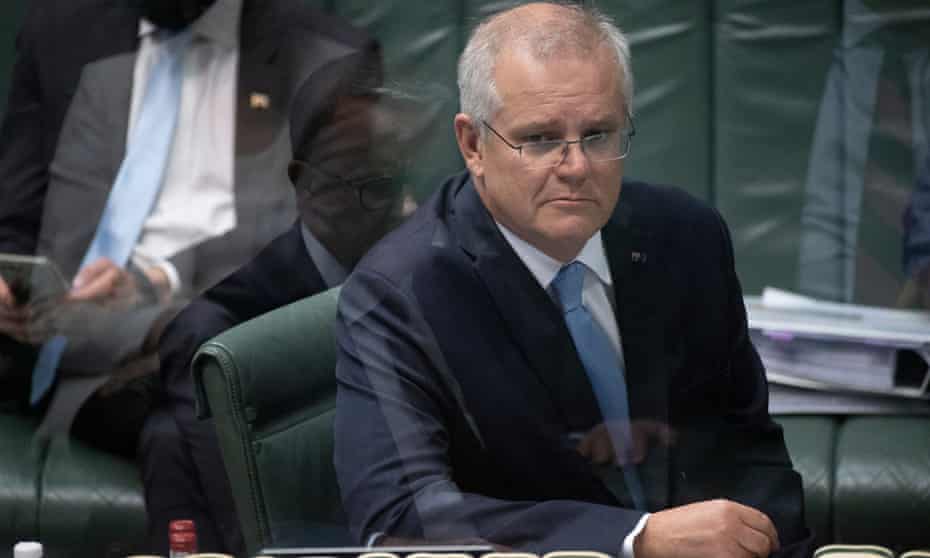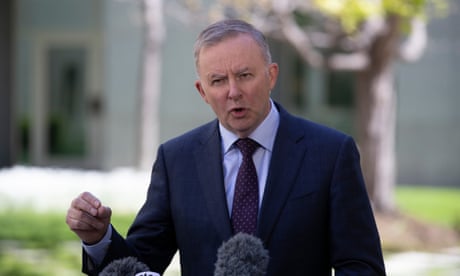Extract from The Guardian
The prime minister wants a fight with Labor to help his re-election chances and Anthony Albanese has finally given him one.

‘Scott Morrison is on the clock for an election. He has looked for weeks like a leader hunting for a knockout blow.’
The government had to park its controversial religious discrimination package – legislation it dearly wanted to get through the House. Same for the voter ID package the Coalition wanted in place before the 2022 campaign. The national integrity commission Morrison has promised for three years wasn’t even introduced.
The crashing and burning of the final fortnight was largely blue-on-blue warfare. Morrison’s own MPs just would not play ball. Liberal senators refused to vote for government proposals. Liberal moderates made it clear they wanted an actual anti-corruption commission rather than the government’s risible proposal, and a group went on strike about a religious discrimination proposal they feared was a sword pointed at gay kids and teachers, not a shield.

There was all that. Then the Jenkins review hit. That was as bad as you might have expected. Australia’s sex discrimination commissioner Kate Jenkins told us more than half the people (51%) currently working in parliament had experienced at least one incident of bullying, sexual harassment or actual or attempted sexual assault, while 77% had experienced, witnessed or heard about such behaviour.
Christian Porter confirmed his long rumoured departure from public life – reminding people he was still there. Rachelle Miller, the former government staffer who featured prominently in the Four Corners episode that presaged parliament’s #MeToo moment, reappeared and levelled new accusations at Alan Tudge, her former boss, a man with whom she had an extramarital relationship. Morrison must have finally reached his limit at that point, because by close of business on Thursday, Tudge, who denies the allegations, stood aside from his ministerial duties pending an investigation.
There was more, but that basic recount will do, because my objective this weekend isn’t looking back. We need to look forward.
Things are obviously pretty challenging for the prime minister right at the minute, and he is on the clock for an election. Morrison has looked for weeks like a leader hunting for a knockout blow.
The prime minister wants a fight with Labor that helps his re-election chances. Anthony Albanese has spent the best part of three years refusing to give him one. Morrison has had to box imaginary alternative scenarios. But the fighting season is now upon us.
Given that reality, Albanese on Friday took his biggest political risk as Labor leader. It’s an entirely safe prediction to say if Labor loses the election next year, Friday’s policy will be proffered as one of the reasons.
After circling those questions for much of this period in opposition, Albanese and Chris Bowen landed the jumbo jet on Friday. Last election, the 2030 target was 45%. This time, the target will be 43% – and unlike before there is economic analysis to better explain the measures.
The climate science clearly tells us a medium-term emissions reduction target bigger than a 43% cut is needed. But the previous election result tells us not all Australians are ready to accept the accelerated transition the science demands. So 43% is the agreed landing point.
Naturally, Morrison went straight to war. The climate ambition war remains what it has always been: hyperbolic, dumb as a bag of hammers, destructive to the national interest, and corrosive to Australia’s standing internationally.
But Morrison showed on Friday he is prepared to wage the war anyway, just to get a grip on something. Anything, really.
Never mind that the prime minister tried, in the lead-up to the Cop26 in Glasgow, to engineer a higher 2030 emissions reduction target himself (although not as high as 43%) only to be thwarted by Barnaby Joyce. All that climate pivot stuff is so pre-Glasgow.
Before Labor even revealed its number, Morrison was limbering up in the parliament, dusting off one of the Coalition’s favourite refrains. If you vote for Anthony Albanese next year, you’ll get a Labor/Greens coalition. Spooky. Kooky. Scary.
Now before anyone rolls their eyes, I encourage you to explore the path Morrison has mapped, because post-election coalitions are quite interesting thought experiments if you spend a few minutes piecing together scenarios.
Let’s start with observation one. Both the government and Labor think it is entirely possible the next election delivers a hung parliament.
So it isn’t just Albanese who might be scrambling for crossbench agreements on confidence and supply shortly after Australians have cast their votes. It is entirely possible Morrison will be in that hunt as well.
The Climate 200 group backing these independents has managed to raise more than $4m from 6,000-plus donors in less than four months. Money doesn’t buy a fledgling political movement love, or competent campaigns or gaffe-free candidates, but it does help. Perhaps some of these insurgents will take seats from Liberals. Perhaps the whole adventure will be a monumental bust.
Let’s return to the resumption of the climate ambition war for just a moment. You really have to wonder whether Morrison picking a fight with Labor on its new 2030 target actually enhances the chances of independents winning some of these contests – increasing the risk of a minority government penalty shoot out.
Picking the old stupid fight might still work in Gladstone, but I’m not convinced its a positive in these metropolitan seats. As they say in the classics, only time will tell. If some of these independents do manage to crash through, it’s worth bearing in mind they will be representing Liberal-leaning constituencies.
I suspect independents like Zali Stegall, or Allegra Spender (in Wentworth) or Zoe Daniel (in Goldstein), would face pressure locally in a minority government scenario to try to reach agreement with Morrison first, rather than back in a Labor government.
It’s unlikely we’ll see a repeat of the detailed minority government agreements that were struck with the then Gillard government in the 43rd parliament. But I suspect locals would want their newly minted independent to establish whether or not Morrison was open to a better climate policy, or an anti-corruption body with teeth, in return for a simple guarantee on confidence and supply.
Would Morrison be prepared to strengthen the Coalition’s climate policy to stay in government? It’s a really interesting question when you turn your mind to it. What would he do?
More importantly, what would the Nationals do? There is a core group in the Nationals party room utterly opposed to near and medium-term ambition. But when faced with a choice between staying on the government benches and doing more, which impulse prevails?
So just know this. When Morrison bangs on in the weeks or months between now and the day he sets off to see the governor general about secret Labor/Greens coalitions – understand there can be more than one side doing a deal.
Understand, too, that the deals could orbit around the same set of issues.
Between now and election day, whatever reheated bollocks you might hear, there is much in play.
No comments:
Post a Comment